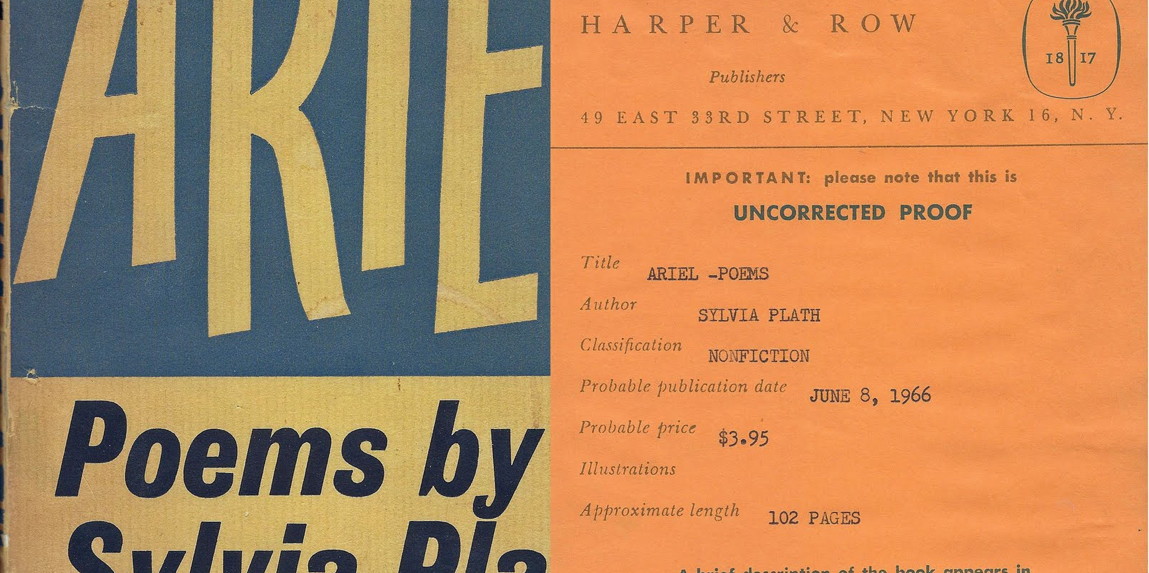Ariel is Plath’s finest collection of poetry, a potent and fierce publication that demonstrates the poet’s rhetorical prowess and aptitude to manipulate several registers of language to create probing, dramatic personae. As a collection, Ariel is also mutable entity. The collection, amassed from a manuscript entitled Ariel and Other Poems that Plath left behind in a black binder on her desk, exists in multiple forms; arrangements, additions, and deletions alter depending on the edition. There’s the British edition from 1965 published by Faber and Faber and edited by Ted Hughes, which was then followed by the American edition published in 1966 by Harper & Row, edited once more by Hughes but including Robert Lowell’s infamous introduction to Plath (the front cover features Lowell’s name in the same size font as Plath’s own). The UK and US editions of Ariel contain different selections of the poems as well as diverge from the manuscript Plath left behind. In 2004, HarperCollins published Ariel: The Restored Edition with a forward by the poet’s daughter, Frieda Hughes. The restored edition features the poems published according to the arrangement and selection of Plath’s original manuscript.
Beyond this question of which poems constitute Ariel, the BBC recordings of Plath’s Ariel-era poems embody further permutations of the oeuvre. Plath read for the BBC in October 1962, when many of these poems were nascent. The audio recordings not only showcase the intensely sonic quality of Plath’s poetry and her commanding voice and deep New England accent, but also disclose alternate versions of the lauded poems. In some cases the differences are slight and subtle: an extra rhyme or two slips into the broken alliterative lines of “Lady Lazarus.” In other cases, the audio recordings communicate entire sections of deleted material, as in the case of “Amnesiac.”
These discrete differences between audio and print versions of the poem demand critical attention.
Last summer, a conversation about versioning with Modernist Versions Project (MVP) players Tanya Clement, Martin Holmes, Susan Schreibman, and Jana Millar-Usiskin led to discussions about how audio figures within the enterprise of versioning. The case of the Plath recordings prompted the MVP to consider expanding the boundaries of versioning techniques and mechanisms to include audio files in addition to text files. This opening up of versioning to include audio helps articulate the mutability of poetry as well as emphasizes its deeply auditory dimension.
Visualizations of the Ariel poems that incorporate the author’s readings would afford a multi-faceted and richer context in which to understand and approach the poetry of Plath for study. Providing scholars and students with audio recordings of poetry in online environments jostles the visual biases of the humanities that are so often reproduced in digital humanities. Plus, poetry recordings permit valuable insights into literary history. For example, the BBC recordings of Plath prompt considerations of the relationship between radio (both as a medium and cultural institution) and poetry, and the status of Plath within national and literary communities. Further, the making available of these recordings for study possesses the potential to open the field of literary criticism to examine further aspects of a poem, such as its status as a performance. The expansion of digital tools to accommodate both textual and audio versions of a poem fosters more layers of interpretation and criticism with regard to sound as well as broadens traditional conceptualizations of poetry as solely print-based. Ideally, the MVP’s interface will articulate both the audio and textual lives of Ariel, visualizing the key discrepancies between print and audio at the level of content, but also offering scholars an environment in which to investigate the public life of a poem and the intensely performative qualities of Plath’s poetry.
Post by Adèle Barclay attached to the ModVers category, with the versioning tag. Image for this post care of Sylvia Plath Info.

